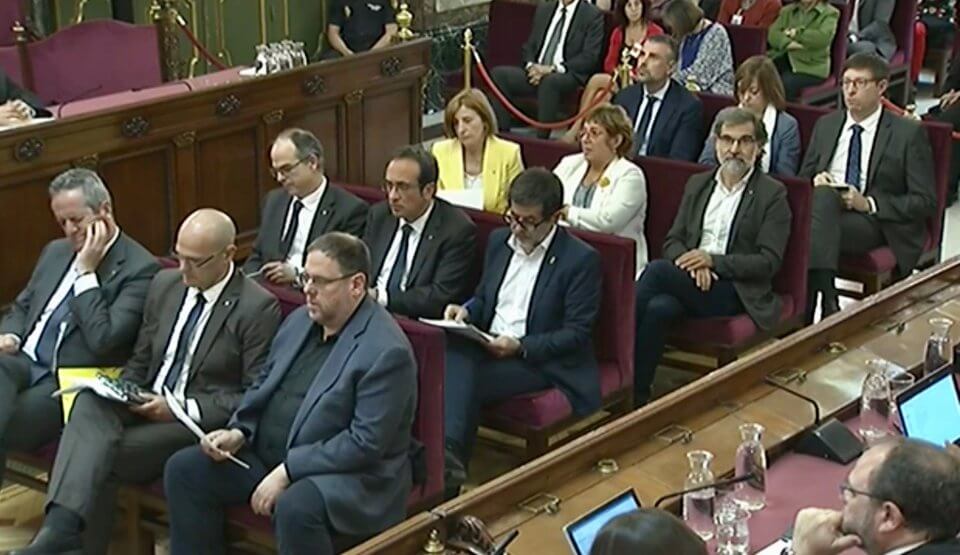After 52 days of court sessions over 4 months (since 12 February) and 422 witness statements, the Catalan Trial has now concluded until verdicts are announced – and which are not expected until the autumn. On Wednesday the defence lawyers concluded their closing arguments and the defendants made their final statements.
Catalan Trial: click here full details of those accused, the charges, and the accusers.
Closing arguments of Marina Roig, lawyer for Jordi Cuixart
The first to speak before the Supreme Court in Madrid was Marina Roig, representing activist Jordi Cuixart, who appealed to international law in order to refute the rebellion charges against her client.
ALSO READ: Catalan Trial: Day 51 – defence summaries
Roig brought up the request by the UN Working Group on Arbitrary Detention to ‘immediately’ release the imprisoned leaders, and also the defence of ‘peaceful resistance’ in the Universal Declaration of Human Rights, in referring to the demonstrations ahead of the 2017 referendum and the independence vote itself.
The lawyer also appealed to the right to freedom of assembly, enshrined in Spain’s Constitution.
‘There is no democracy without democracy, and there is no democracy without citizen participation,’ she said.
ALSO READ: Catalan Trial: Day 50 – prosecution summaries
Continuing with the theme of rights, the lawyer also insisted that ‘the defence of Spain’s unity cannot sacrifice fundamental human rights recognised around the world.’
She also spoke out against ‘criminalising’ public protest, calling it a ‘mistake’ and warning that it can have dangerous consequences for fundamental rights in Spain.
Speaking up for her client, the lawyer added that Jordi Cuixart ‘always insisted on any gathering of people maintaining a peaceful, civic, serene, and calm nature.’
ALSO READ: Catalan trial: controversy over ‘rebellion’ and violence
Closing arguments of Olga Arderiu, lawyer for Carme Forcadell.
Former Catalan Parliament speaker Carme Forcadell is being tried ‘for who she is, and not for what she did’ in the independence bid, according to her defence lawyer Olga Arderiu.
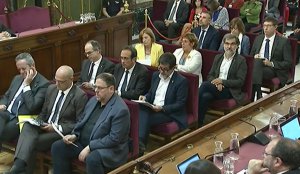
In her closing arguments on Wednesday in the Supreme Court, she said that in their final reports the prosecutors emphasised her role as pro-independence civic organisation Catalan National Assembly (ANC)‘s president until 2015 – even though the events she is supposed to be tried for happened in 2017.
She also complained that her client is facing a 17-year prison sentence for rebellion when the other former Catalan parliament bureau members are being prosecuted for disobedience, which does not carry prison time.
ALSO READ: Jordi Sànchez: ‘Nothing we’ve seen in our trial justifies prison’
Arderiu also pointed out that the prosecutor has sustained several ‘false’ facts in order to incriminate her, such as ‘invented’ tweets, meetings, and events that the jailed politician supposedly took part in.
The Constitutional Court, which had issued warnings against holding the referendum in 2017, was also called ‘biased’ during Arderiu’s speech. ‘Spain’s Constitutional Court started criminalising the Catalan parliament bureau when there was a majority of MPs that could implement independence,’ she added.
She ended her speech by requesting Forcadell’s release when the trial ends and referred to a manifesto demanding her freedom that has been backed by 614 MPs of 49 parliaments worldwide.
ALSO READ: A UN group demands release of Sànchez, Cuixart and Junqueras
On Wednesday it was made public by the press that Forcadell’s petition against her preventive imprisonment to the European Court of Human Rights (ECHR) had been rejected by the court for reasons that the ECHR has not shared, as is common practice.
After Forcadell’s lawyer, it was the turn of the defence lawyer of Meritxell Borràs. Borràs is the former Catalan governance minister who is out on bail while being prosecuted for misuse of public funds.
Borràs’ lawyer rejected the allegations of misuse of public funds and complained of what she described as the prosecutors’ ‘bias’.
ALSO READ: Lawyer Ben Emmerson: ‘Spain is acting like a rogue State’
The defence of jailed former minister Dolors Bassa took the stand after her with arguments that were along the same lines of those of his colleagues.
‘Calling for the referendum was not a call to violence. They intended to achieve independence by voting and through dialogue,’ said lawyer Mariano Bergés. ‘What happened in September 2017 was not violence. The pro-independence demonstrations were always peaceful.’
ALSO READ: Thousands rally in Madrid against Catalan Trial
Closing statements from the defendants
To conclude the trial, the 12 jailed leaders were each given an opportunity to share their closing remarks (15 minutes each) on why they should not be charged with rebellion and misuse of public funds, as has been requested by the prosecution for their roles in the events surrounding the 2017 independence referendum.
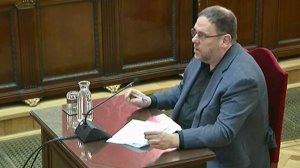
Oriol Junqueras
The former Catalan vice-president Oriol Junqueras, the most senior politician in the dock, was the first to emphasise the importance of political dialogue rather than legal judgments for resolving the crisis.
Junqueras explained his reasons for participating in the independence bid and highlighted the importance of dialogue and exchange: ‘Talking and listening is the basis of any agreement.’ Junqueras also said that the Catalan independence issue should be dealt with through politics and not through the judicial system.
‘It’s time for the Catalan question to return to the political sphere of dialogue and negotiation, which it should never have left,’ he said.
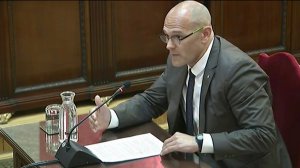
Raül Romeva
Raül Romeva, the former Catalan foreign affairs minister, adopted a global perspective, calling on ‘all democrats’ to create a society ‘where there are no political trials’.
‘Today it is us, tomorrow it could be anyone,’ he warned, before attacking the prosecution for ‘bias’ and ‘distortion’ of reality during the trial.
He told the court that he had always stood up for the right to non-violent self-determination, rather than the alleged violence that is being used to justify the accusations of rebellion.
Romeva accused the prosecution of ‘misrepresentations’, which sought to ‘punish an ideology’.
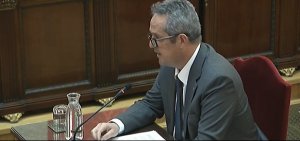
Joaquim Forn
Joaquim Forn, the ousted Catalan interior minister described the trial as a ‘punishment for the political challenge that the referendum posed’ and the result of ‘political failure’, restating his firm belief that the Catalan question can ‘only ever be resolved through dialogue’.
He emphasised that the ballot ‘had the support of the majority in parliament and in society’ and said that, as the minister responsible for maintaining public order, he ‘may have made mistakes but never worked to compromise the safety of citizens’.
He said ‘at no time did we hide our intention to hold the referendum’.
Forn said that he had been put in jail on remand for his political ideas and ideology.
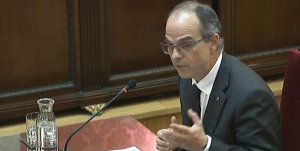
Jordi Turull
Jordi Turull, the former Catalan president’s office minister and government spokesperson employed a revolutionary metaphor to describe the possible jail sentence hanging over the defendants.
‘Decapitating us will not decapitate the independence movement or the desire for independence and self-determination in Catalonia,’ he said.
Turull ended by stating the ‘deep’ convictions that he has dedicated his political life towards – ‘to deals and agreements’. ‘I am pro-independence and I will not hide that’ – and ‘dialogue must always be the path’.
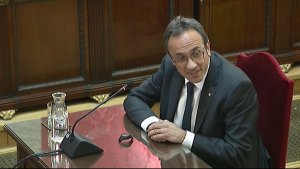
Josep Rull
Josep Rull, the former Catalan territory and sustainability minister, took the opportunity to insist that Catalan independence was, in his view, inevitable.
He said that Catalonia would one day become a republic ‘where it would be impossible for anyone to be put in prison simply for standing up for what they believe in’.
‘Self-determination is simple and transcendental. There will always be more people following us. There are not enough prisons to lock up our desire for freedom,’ he added.
Rull said he is accused of rebellion ‘basically because I haven’t given up my political activity’.
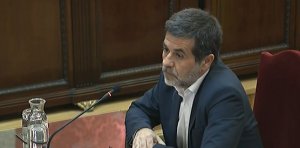
Jordi Sànchez
Jordi Sànchez, the activist turned politician chose to denounce the ‘abuse of preventative imprisonment’ that he believes has ‘unfairly’ resulted in him already spending over a year behind bars.
‘This is an enormous injustice, not only for me and for the other pro-independence prisoners but in general around Spain,’ he explained. He said he felt like a victim of state injustice.
He finished with an appeal for political sensitivity from the magistrates.
He said the judges have a responsibility to ‘not aggravate’ the political problem that had been handed on to them. He said, ‘I hope your judgement serves to solve’ what the politicians did not know how to resolve.
He ended with ‘a ballot box can never be the threat to democracy’ and ‘in Catalonia, there will be ballot boxes and we will vote’ in an agreed upon referendum.
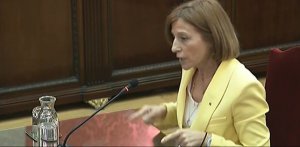
Carme Forcadell
Carme Forcadell, the Catalan Parliament speaker at the time of the 2017 referendum and declaration of independence, accused the prosecutors of judging her on the basis of her ‘political career and not the facts’.
She contrasted her charge of rebellion with those of her colleagues on the Catalan Parliament Committee, who are standing trial for disobedience in Catalonia, saying that she always acted on the same terms as them.
Forcadell said she had been prosecuted ‘with false testimony without any evidence’, and that the 4 months of trial ‘have been worthless’.
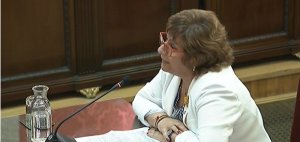
Dolors Bassa
Dolors Bassa, the Catalan trade unionist and former work, social affairs and families minister, stressed that ‘generations to come will depend on this verdict, which has the potential to provide a solution’.
She said that ‘the will of 80% of the people [to hold a referendum] could not be ignored’ and said that true disobedience would have been failing to comply with that manifesto promise.
‘I deny the events attributed to me. I am innocent,’ she said. She said that she had never promoted violence and ended her statement with: ‘The coming generations depend on your sentence. Your sentence will not only be about my freedom, but that of a lot of generations. It may be the beginning of a solution for a lot of people.’
Jordi Cuixart
Jordi Cuixart, the president of pro-independence association Òmnium Cultural defended the right to protest for self-determination, whatever the outcome of the trial.
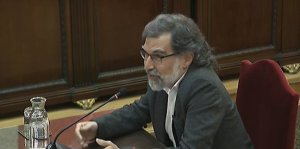
‘If police violence could not stop thousands of people from voting in the referendum, does anyone believe that a sentence will cause Catalans to stop fighting for their rights?’ he said.
He said he reasserted everything, ‘the voice of my conscience’ in ‘my most public life’, ‘there is no repentance at all’, and he would do it all again ‘because it is what I had to do’.
Cuixart refuted all rebellion allegations, saying ‘this is a political trial’. He also admitted having called for a permanent mobilisation in 2017. ‘We were limited to all an ordinary citizen can do: protest.’
Cuixart said he is trying to defend everyone’s fundamental rights.
Making his final remarks, he said: ‘The quality of Spanish democracy will depend on the outcome of this trial.’ He defends “civil disobedience” on referendum day on the grounds that people wanted to exercise fundamental rights
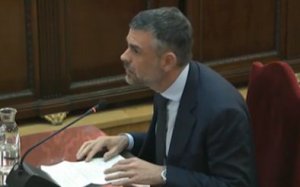
Santi Vila
Santi Vila, the former Catalan business minister urged magistrates to avoid making the mistake of ‘anachronism or presentism’ by analysing the 2017 independence drive according to its consequences.
He emphasised that the Catalan government had been negotiating a possible legal alternative to the independence declaration ‘until the last minute’.
He said that families were broken and that a society, the Catalan one, was suffering. Vila, who is not accused of rebellion, also said: ‘I don’t agree that Spain isn’t a state ruled by law or a democracy.’
‘I hope your sentence contributes to the solution [of Catalonia],’ he told the court in his final remarks.
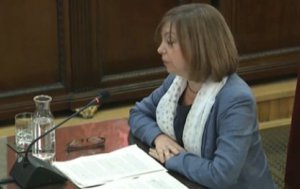
Meritxell Borràs
Meritxell Borràs, the former Catalan governance, public administration and housing minister, accused of misuse of funds – but who is not in custody – referred to autumn 2017: ‘There was no uprising in Catalonia, but a political conflict.’
Borràs asked the court to consider that this sentence will not solve the political conflict.
‘New politicians will come and the longing of a sizeable proportion of the Catalan people to decide how we want to fit into a modern Europe will continue,’ she highlighted.
Borràs also said that it was another chapter in the history of the survival of Catalonia.
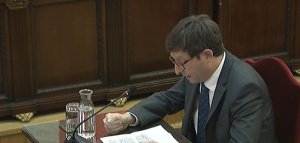
Carles Mundó
Carles Mundó, the former Catalan justice minister, accused of the misuse of public funds, said that he believed in politics and justice.
‘This trial is the result of the failure of politics, but we are in time to find solutions, it is never too late,’ he said.
Catalan Trial: click here full details of those accused, the charges, and the accusers.
Click here for all articles and updates on the Catalan Trial
ALSO READ: Catalan Trial: Day 51 – defence summaries
ALSO READ: Catalan Trial: Day 50 – prosecution summaries
ALSO READ: Catalan Trial: Day 49 summary
ALSO READ: Catalan Trial: Day 48 summary
ALSO READ: Catalan Trial: Day 47 summary
ALSO READ: Catalan Trial: Day 46 summary
ALSO READ: Catalan Trial: Day 45 summary
ALSO READ: Catalan Trial: Day 44 summary
ALSO READ: Catalan Trial: Day 43 summary
ALSO READ: Catalan Trial: Day 42 summary
ALSO READ: Catalan Trial: Day 41 summary
ALSO READ: Catalan Trial: Day 40 summary
ALSO READ: Catalan Trial: Day 39 summary
ALSO READ: Catalan Trial: Day 38 summary
ALSO READ: Catalan Trial: Day 37 summary
ALSO READ: Catalan Trial: Day 36 summary
ALSO READ: Catalan Trial: Day 35 summary
ALSO READ: Catalan Trial: Day 34 summary
ALSO READ: Catalan Trial: Day 33 summary
ALSO READ: Catalan Trial: Day 32 summary
ALSO READ: Catalan Trial: Day 31 summary
ALSO READ: Catalan Trial: Day 30 summary
ALSO READ: Catalan Trial: Day 29 summary
ALSO READ: Catalan Trial: Day 28 summary
ALSO READ: Catalan Trial: Day 27 summary
ALSO READ: Catalan Trial: Day 26 summary
ALSO READ: Catalan Trial: Day 25 summary
ALSO READ: Catalan Trial: Day 24 summary
ALSO READ: Catalan Trial: Day 23 summary
ALSO READ: Catalan Trial: Day 22 summary
ALSO READ: Catalan Trial: Day 21 summary
ALSO READ: Catalan Trial: Day 20 summary
ALSO READ: Catalan Trial: Day 19 summary
ALSO READ: Catalan Trial: Day 18 summary
ALSO READ: Catalan Trial: Day 17 summary
ALSO READ: Catalan Trial: Day 16 summary
ALSO READ: Catalan Trial: Day 15 summary
ALSO READ: Catalan Trial: Day 14 summary
ALSO READ: Catalan Trial: Day 13 summary
ALSO READ: Catalan Trial: Day 12 summary
ALSO READ: Catalan Trial: Day 11 summary
ALSO READ: Catalan Trial: Day 10 summary
ALSO READ: Catalan Trial: Day 9 summary
ALSO READ: Catalan Trial: Day 8 summary
ALSO READ: Catalan Trial: Day 7 summary
ALSO READ: Catalan Trial: Day 6 summary
ALSO READ: Catalan Trial: Day 5 summary
ALSO READ: Catalan Trial: Day 4 summary
ALSO READ: Catalan Trial: Day 3 summary
ALSO READ: Catalan Trial: Day 2 summary
ALSO READ: Catalan Trial: Day 1 summary

